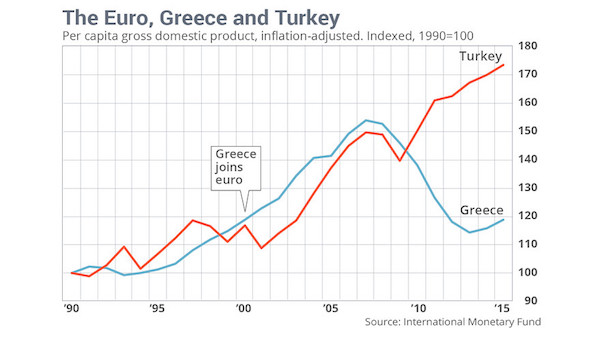
Pablo Picasso The dream 1951

As we approach the end of the first half of 2020, I’m seriously rethinking how to cover COVID19 going forward. The past five months have been intense in that regard, and at a certain point you need to wonder how useful such time-consuming work still is. For a long time I had the hope and belief that “we” would be able to halt the spread of the coronavirus, if only because that was -and is- the only sensible way to deal with a new pathogen about which very little is known, other than that it is potentially deadly.
But despite a huge number of actions, including lockdowns in many countries and societies, the infection numbers only keep rising. And at this point is is entirely unclear how countries like the US and Brazil will ever be able to get rid of the virus.
The consequences will be grave, albeit different in different places. We will see overwhelmed healthcare systems in some countries and states, while others will remain relatively unscathed, at least for a while. Ironically, in a world used to so much travelling it’s even useful to wonder what good it does to do a lockdown well. How long can New Zealand keep its borders closed?
As for healthcare, there was a report that it will take four years for the UK’s NHS to recover from COVID19, and that based on what they have experienced so far, while there is still plenty room for second or third waves, and/or any unforeseeable extra pressure.
Tourism as we’ve known it will never recover, at least not on a timescale that is meaningful to us. That whole industry needs a great reset. That is of course also true for airlines, plane manufacturers et al. As it is for the entire hospitality industry. People will be cautious when going out, the fear of infection rules supreme, as demonstrated again by this report from NBER, Fear, Lockdown, and Diversion, which shows it wasn’t the lockdowns that did the most damage.
This paper examines the drivers of the collapse using cellular phone records data on customer visits to more than 2.25 million individual businesses across 110 different industries. Comparing consumer behavior within the same commuting zones but across boundaries with different policy regimes suggests that legal shutdown orders account for only a modest share of the decline of economic activity (and that having county-level policy data is significantly more accurate than state-level data).
While overall consumer traffic fell by 60 percentage points, legal restrictions explain only 7 of that. Individual choices were far more important and seem tied to fears of infection. Traffic started dropping before the legal orders were in place; was highly tied to the number of COVID deaths in the county; and showed a clear shift by consumers away from larger/busier stores toward smaller/less busy ones in the same industry.
But I have to admit, over the past few days, when I was silent, I’ve become ever more worried by the American political and societal situation than by coronavirus. The images of people with guns standing outside of their homes, the stories of police and mob violence, shootings in “police-free” zones, it all starts to smell like a civil war.
While I wasn’t writing, I was reading all the more from both sides of aisle, and whatever they may still have had in common appears to disappear rapidly. The hunt for Trump continues unabated with yet another anonymous and unsourced tale about RussiaRussia, while the right is organizing to counter what they see as lawlessness across the nation.
Frank Miele, in a article below, quotes Bobby Kennedy, speaking after MLK was shot:
“The victims of the violence are black and white, rich and poor, young and old, famous and unknown. They are, most important of all, human beings whom other human beings loved and needed. No one — no matter where he lives or what he does — can be certain who will suffer from some senseless act of bloodshed. And yet it goes on and on. Why? What has violence ever accomplished? What has it ever created? … No wrongs have ever been righted by riots and civil disorders. … [A]n uncontrolled, uncontrollable mob is only the voice of madness, not the voice of the people.”
That sounds like a voice of reason that is sorely needed by the country right now. But does anyone see any of those? Ideally, Trump and Biden would get together on live TV to ask their supporters to please calm down. But I don’t see that happening in the present climate either. It’s become too polarized, fed by media and their business models.
I’m just trying to make sense of it all. Trying to find a way out of the mess, a way forward. But right now I’m mostly just thinking that Independence Day could turn into an incredibly messy affair. Or any other day between now and the election.

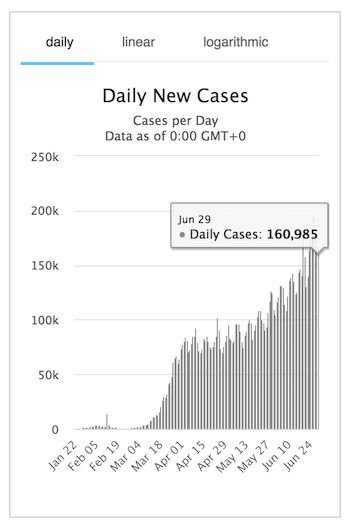
US has fifth day in a row with over 40,000 new cases
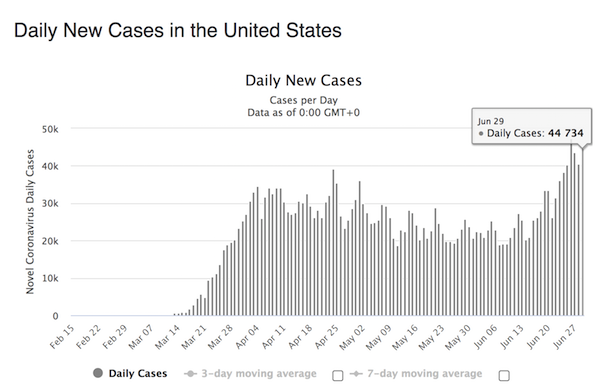

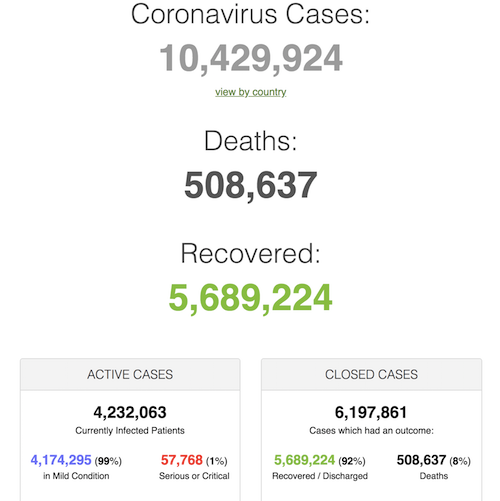

Does anyone want to take on the task of telling NY they need to restrict southern Californians?
Just because northern California has fewer cases per capita, doesn't mean southern California travelers are low risk for NY, NJ, CT. https://t.co/7t5WVTh2an pic.twitter.com/iXDJQ9m1JC
— Yaneer Bar-Yam (@yaneerbaryam) June 29, 2020

Key line: “The candidate is yet to start phase three trials, which would confirm whether it could protect recipients from infection.”
• China’s Military Becomes First To Use Experimental Coronavirus Vaccine (SCMP)
China has approved military use of an experimental coronavirus vaccine developed by the People’s Liberation Army and a Chinese pharmaceutical company, in a first for the armed forces of any country. The vaccine, identified as Ad5-nCoV, was jointly developed by a team at the Academy of Military Medical Sciences, led by Major General Chen Wei, and Tianjin-based company CanSino Biologics. It is the first time that a vaccine candidate for Covid-19, the disease caused by the coronavirus, has been authorised for use for the military of any nation. CanSino said on Monday that the candidate had been through two phases of clinical trials, which indicated it was safe and there was “relatively high” immune response to the antigen.
The candidate is yet to start phase three trials, which would confirm whether it could protect recipients from infection. The military has approved its use for a year but it has not been authorised for civilian purposes. Adding Ad5-nCoV to the People’s Liberation Army’s catalogue of special drugs means that it can be deployed in major outbreaks. It is based on an Ebola vaccine that was developed by Chen but did not go into mass production. Scientists are racing to find an answer to the coronavirus that has already infected more than 10 million people and killed over 500,000. New cases continue to surge in the United States and India, with the US confirming more than 40,000 new cases for the third straight day on Monday.
According to the World Health Organisation, clinical trials are under way for 17 vaccine candidates, seven of which have been developed in China. One candidate developed by Oxford University and AstraZeneca is in phase three studies. Phase one and two studies typically test if a candidate is safe and whether it can generate an immune response from the recipients, but vaccines must complete all three sets of trials to be licensed. CanSino said it completed phase two trials on June 11, but the company has not yet released data from the study. [..] Many Chinese candidates are planning phase three trials in other countries as the spread of the coronavirus in China is too limited to test the efficacy of the vaccine. CanSino reached an agreement with Canadian government to conduct phase three trials there but details of the studies have not been revealed.

We’ll see anti-police protests and anti-lockdown protests all at the same time.
• California, Texas See Record COVID-19 surges, Arizona Clamps Down (R.)
California and Texas both marked record spikes in new COVID-19 infections on Monday, a Reuters tally showed, as Los Angeles reported an “alarming” one-day surge in America’s second-largest city that put it over 100,000 cases. Los Angeles has become a new epicenter in the pandemic as coronavirus cases and hospitalizations surge there despite California Governor Gavin Newsom’s strict orders requiring bars to close and residents to wear masks in nearly all public spaces. “The alarming increases in cases, positivity rates and hospitalizations signals that we, as a community, need to take immediate action to slow the spread of COVID-19,” Barbara Ferrer, director of public health for Los Angeles County, said in a statement announcing the sharp rise.
“Otherwise, we are quickly moving toward overwhelming our healthcare system and seeing even more devastating illness and death,” Ferrer said. Los Angeles Mayor Eric Garcetti announced a “hard pause” on when movie theaters, theme parks and other entertainment venues can reopen. Los Angeles County is the biggest movie theater market in the United States. Los Angeles County said its beaches will be closed for the Independence Day weekend and fireworks displays will be banned.
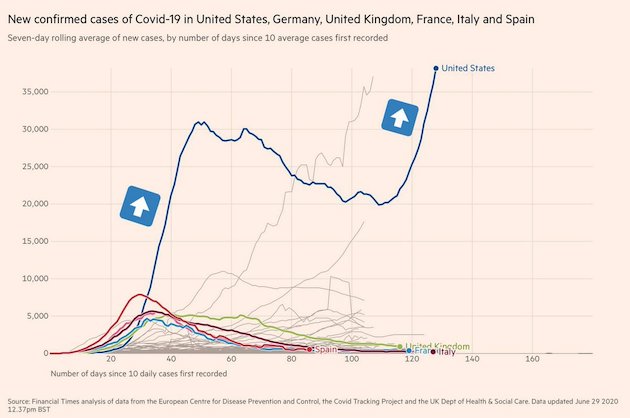

is there a better example of the future of tourism?
• Norwegian Air Cancels 97 Boeing MAX And Dreamliners, Claims Compensation (R.)
Norwegian Air has cancelled orders for 97 Boeing aircraft and will claim compensation from the U.S. plane maker for the grounding of the 737 MAX and for 787 engine troubles that hit its bottom line, the Oslo-based carrier said on Monday. The airline cancelled 92 of the 737 MAX jets, five 787 Dreamliners and so-called GoldCare service agreements related to both aircraft, just as Boeing on Monday began a crucial set of flight tests of the 737 MAX in an effort to gain regulatory approval for it to return to the skies.
“Norwegian has in addition filed a legal claim seeking the return of pre-delivery payments related to the aircraft and compensation for the company’s losses related to the grounding of the 737 MAX and engine issues on the 787,” the airline said. Norwegian did not specify the amount it would seek to claim from Boeing, which it had been in talks with about compensation, and was not immediately available for comment. Boeing said it was working with Norwegian on a path forward in a challenging time as it was with other operators but it would not comment on commercial discussions.

Nothing has changed in Europe.
• Europe’s Recovery Fund: An Instrument of Class War (Varoufakis)
Europe was never the battlefield on which the frugal North clashed with the profligate South. Instead, every European country has been the battlefield where a vicious class war is fought by a transnational oligarchy-without-frontiers training its armour against the weaker residents of every country, every region, every community. COVID-19, and the European Union’s response to it, only magnifies the human costs of this unremitting class war. All talk of a North-South clash is founded on a gigantic lie, that is based on many small truths, conveniently hiding from Europeans’ gaze the class war that diminishes their life prospects.
The crisis of financialisation in 2008 intensified Europe’s class war massively, holding a majority of Northern and Southern Europeans behind and leaving Europe, including its capitalist class, much weakened in relation to the rest of the world — the United States and China in particular. Twelve years on, COVID-19 gives this crisis a new, violent spin. The weak are weakened much, much more while Europe as a whole falls further and further behind the United States and China. While the EU’s leadership and bureaucracy have been quite active in the past three months, producing one impressive-sounding policy announcement after the next, the sum of their actions boost the class war that enfeebled Europe over the past decade and weakened a majority of Europeans everywhere.
[..] Rumours that Covid-19 caused the EU to lift its game are grossly exaggerated. Good people who took heart from the news that, however reluctantly, the EU has embraced common debt in a bid to further the cause of pan-european solidarity, will soon be deeply disappointed. Behind the heroic pronouncements and the triumphant propaganda lurks a sordid truth: The class war against Europe’s weaker people is escalating. And so is Europe’s descent into global irrelevance.
It all began with the quiet death of the Eurobond. Eurobonds, as advocated by DiEM25, would perform a simple task: They would automatically convert any new Italian, Spanish or Greek public debt (due to the impact of the pandemic on public revenues and expenses) into European debt (in the same way that US Treasury Bills absorb the costs of a recession in Missouri and Wisconsin). But, once the Eurobond was killed off by the Eurogroup in early April, it is now a given that the gigantic increase in national budget deficits will be followed by equally sizeable austerity in every country — a euphemism for the intensification of the class war that depletes the already atrophied incomes of the majority in each of our countries.

Excellent piece, what ever side you’re on.
• We Digitized the Mob, and There’s No Place to Hide (Miele)
The most shocking aspect of the wave of rioting and destruction that has been unleashed on many of our American cities in the wake of George Floyd’s death is not that there is an underlying discontent with the rate of progress in racial equality. That is understandable. What is not is the way that mayors, governors and members of Congress have not just tolerated, but endorsed, mob violence as an acceptable weapon of social change. Growing up in the turbulent 1960s, I was given a very specific warning by my mother: If you ever get caught up in a mob, get out of it as soon as possible because a mob has no brain. It just has emotion — and whether that emotion is anger, hatred or even joyful exuberance, it cannot be controlled.
We saw that in Minneapolis following the death of George Floyd while in police custody. People with a brain were outraged by what they saw. They wanted to protest, to speak out, and to demand justice. But when they came together in the streets, they discovered how quickly protest can transform into riot, and how demands for justice can be used to justify injustice. The basic premise of justice, after all, is recompense, making sure that wrongdoers pay a price for their crime. Yet there was no recompense in burning the businesses of innocent bystanders. There was no justice in stealing TVs and PlayStations. This was just brainless mob violence. It was shameful and it should have been easily condemned by the politicians, news media and celebrities who were not part of the mob.
That’s what would have happened in the 1960s. When Martin Luther King Jr. was murdered, leading to riots across America in 1968, Bobby Kennedy appealed for peace amidst “this mindless menace of violence in America which again stains our land and every one of our lives.” The parallel is exact. A black man is unjustly murdered. The nation is outraged. Riots ensue. The only part that is missing today is a respected grown-up like Kennedy who would condemn the violence and recognize that “[i]t is not the concern of any one race.” As Kennedy said,
“The victims of the violence are black and white, rich and poor, young and old, famous and unknown. They are, most important of all, human beings whom other human beings loved and needed. No one — no matter where he lives or what he does — can be certain who will suffer from some senseless act of bloodshed. And yet it goes on and on. Why? What has violence ever accomplished? What has it ever created? … No wrongs have ever been righted by riots and civil disorders. … [A]n uncontrolled, uncontrollable mob is only the voice of madness, not the voice of the people.”
What a refreshing expression of common sense, and what a contrast it offers to the bleating appeasers from the Democratic Party today who have bent a knee in obeisance to the mob, to the rioters, to the monument defacers, to the statue topplers. But it’s not just the Democrats who have bowed to the “voice of madness.” Most Republicans are right there with them. So too are corporate entities such as Intel and Amazon, and sporting organizations such as the NFL and NASCAR. For their part, news outlets such as CNN and MSNBC are promoting the riots and the cleansing of American history that is being pushed by Black Lives Matter. The question is why?
It is easy to understand why someone surrounded by the mob surrenders to its power, but those corporate boardrooms are far from the fray and well-protected from the torches and Molotov cocktails. So why have they turned their backs on law and order and embraced the mob? What has changed since the 1960s that makes it so much harder for leaders in government, business and culture to condemn violence and lawlessness? The answer will not surprise you, but it should scare you. Somewhere along the way, we digitized the mob. The few dozen people surrounding a statue are not the problem. The few hundred people confronting police are not the problem. The few thousand people looting stores and throwing rocks are not the problem. The mob on the street is not the problem. The mob on the street is the symptom.
The millions of people acting without moral restraint, without reason and without fear of consequences on the Internet are the problem. Indeed, the digital mob is the unintended consequence of the Internet itself. Connecting the world via technology was supposed to encourage communication, understanding and a breaking down of barriers. Instead it has resulted in a world divided into silos, special interests, identity groups. We tend to seek out those we have the most in common with and to block, ban or troll those who are unlike us. We feel safety in numbers, and from that safety is often bred outright contempt for those who think differently.

We try to run the Automatic Earth on donations. Since their revenue has collapsed, ads no longer pay for all you read, and your support is now an integral part of the interaction.
Thank you.

I’ll close today with a series of clips of an interview yesterday with Michael Fynn’s attorney Sidney Powell, who’s going to be an important voice in the run-up to November 3, whether you agree with her or not. Stay safe.

Sidney Powell came into this case believing @GenFlynn was innocent and she will not stop until that’s proven or until the Supreme Court denies Her petition for rehearing if necessary. @SidneyPowell1 pic.twitter.com/hMkQUZ4I55
— The Dirty Truth (@RealDirty on Parler) (@AKA_RealDirty) June 30, 2020
The longer Judge Sullivan keeps the case open the more stuff they owe @SidneyPowell1. There’s still a long list of stuff that she knows is there. Like the memo that fully exaggerates @GenFlynn. pic.twitter.com/ezkoFet0rN
— The Dirty Truth (@RealDirty on Parler) (@AKA_RealDirty) June 30, 2020
.@SidneyPowell1 says @GenFlynn isn’t under any kind of gag order. Discretion is valor and he’s full of Valor. pic.twitter.com/JjLIqrR31v
— The Dirty Truth (@RealDirty on Parler) (@AKA_RealDirty) June 30, 2020


Support the Automatic Earth in virustime.







